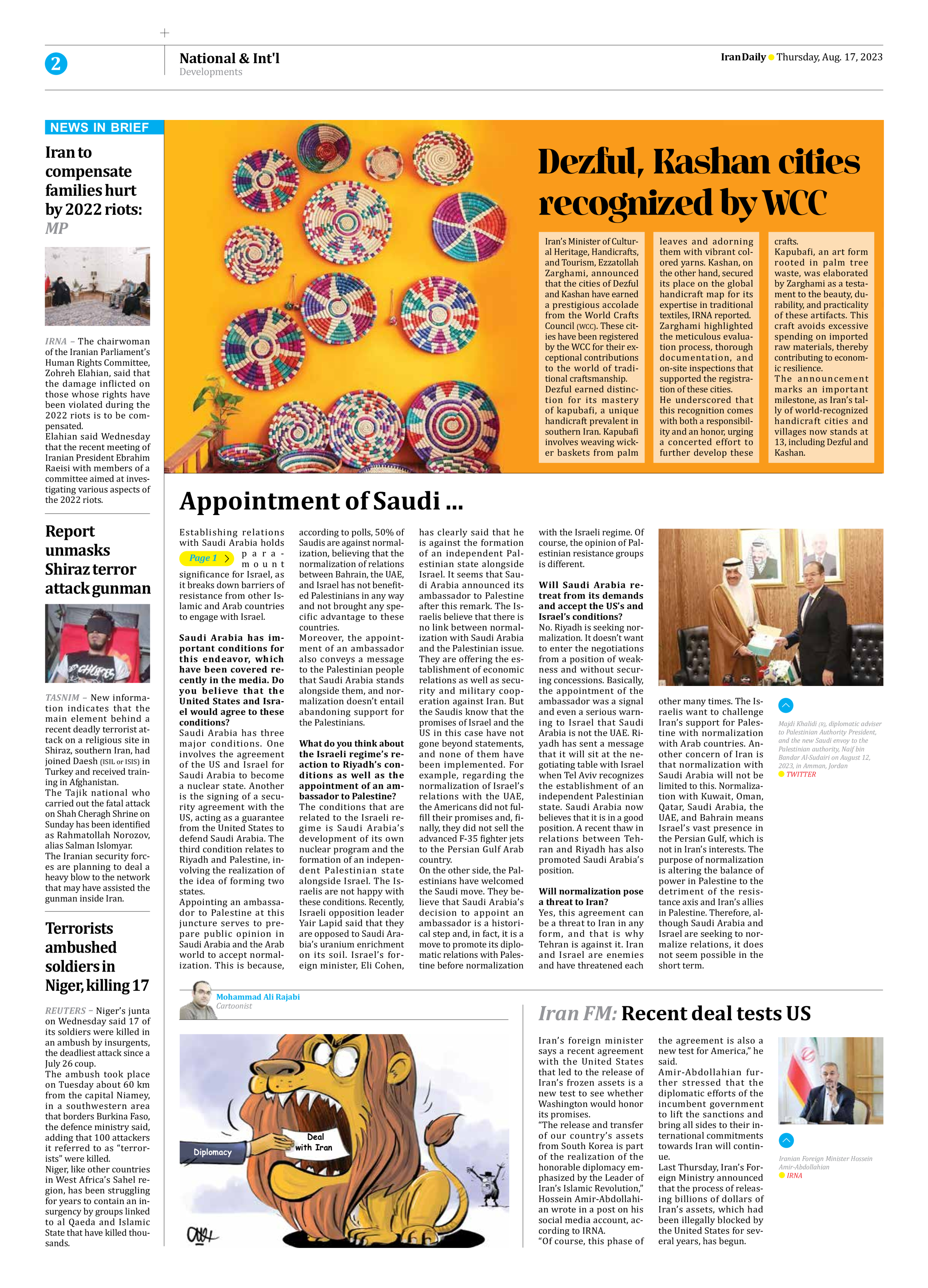
Appointment of Saudi ...
Page 1
Establishing relations with Saudi Arabia holds paramount significance for Israel, as it breaks down barriers of resistance from other Islamic and Arab countries to engage with Israel.
Saudi Arabia has important conditions for this endeavor, which have been covered recently in the media. Do you believe that the United States and Israel would agree to these conditions?
Saudi Arabia has three major conditions. One involves the agreement of the US and Israel for Saudi Arabia to become a nuclear state. Another is the signing of a security agreement with the US, acting as a guarantee from the United States to defend Saudi Arabia. The third condition relates to Riyadh and Palestine, involving the realization of the idea of forming two states.
Appointing an ambassador to Palestine at this juncture serves to prepare public opinion in Saudi Arabia and the Arab world to accept normalization. This is because, according to polls, 50% of Saudis are against normalization, believing that the normalization of relations between Bahrain, the UAE, and Israel has not benefited Palestinians in any way and not brought any specific advantage to these countries.
Moreover, the appointment of an ambassador also conveys a message to the Palestinian people that Saudi Arabia stands alongside them, and normalization doesn’t entail abandoning support for the Palestinians.
What do you think about the Israeli regime’s reaction to Riyadh’s conditions as well as the appointment of an ambassador to Palestine?
The conditions that are related to the Israeli regime is Saudi Arabia’s development of its own nuclear program and the formation of an independent Palestinian state alongside Israel. The Israelis are not happy with these conditions. Recently, Israeli opposition leader Yair Lapid said that they are opposed to Saudi Arabia’s uranium enrichment on its soil. Israel’s foreign minister, Eli Cohen, has clearly said that he is against the formation of an independent Palestinian state alongside Israel. It seems that Saudi Arabia announced its ambassador to Palestine after this remark. The Israelis believe that there is no link between normalization with Saudi Arabia and the Palestinian issue. They are offering the establishment of economic relations as well as security and military cooperation against Iran. But the Saudis know that the promises of Israel and the US in this case have not gone beyond statements, and none of them have been implemented. For example, regarding the normalization of Israel’s relations with the UAE, the Americans did not fulfill their promises and, finally, they did not sell the advanced F-35 fighter jets to the Persian Gulf Arab country.
On the other side, the Palestinians have welcomed the Saudi move. They believe that Saudi Arabia’s decision to appoint an ambassador is a historical step and, in fact, it is a move to promote its diplomatic relations with Palestine before normalization with the Israeli regime. Of course, the opinion of Palestinian resistance groups is different.
Will Saudi Arabia retreat from its demands and accept the US’s and Israel’s conditions?
No. Riyadh is seeking normalization. It doesn’t want to enter the negotiations from a position of weakness and without securing concessions. Basically, the appointment of the ambassador was a signal and even a serious warning to Israel that Saudi Arabia is not the UAE. Riyadh has sent a message that it will sit at the negotiating table with Israel when Tel Aviv recognizes the establishment of an independent Palestinian state. Saudi Arabia now believes that it is in a good position. A recent thaw in relations between Tehran and Riyadh has also promoted Saudi Arabia’s
position.
Will normalization pose a threat to Iran?
Yes, this agreement can be a threat to Iran in any form, and that is why Tehran is against it. Iran and Israel are enemies and have threatened each other many times. The Israelis want to challenge Iran’s support for Palestine with normalization with Arab countries. Another concern of Iran is that normalization with Saudi Arabia will not be limited to this. Normalization with Kuwait, Oman, Qatar, Saudi Arabia, the UAE, and Bahrain means Israel’s vast presence in the Persian Gulf, which is not in Iran’s interests. The purpose of normalization is altering the balance of power in Palestine to the detriment of the resistance axis and Iran’s allies in Palestine. Therefore, although Saudi Arabia and Israel are seeking to normalize relations, it does not seem possible in the short term.







